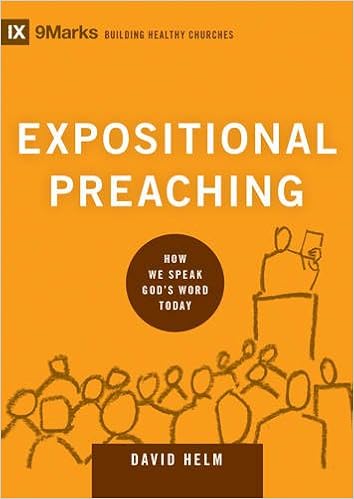 The atheist philosopher Friedrich Nietzsche wrote, “he who knows himself to be profound endeavors to be clear; he who would like to appear profound endeavors to be obscure.” Too many homileticians labor to sound profound as they seek to make their books academic. Thankfully, not David Helm. His book, Expositional Preaching: How We Speak God’s Word Today, is short, lucid and insightful. I have read many books on preaching in recent years and, I must confess, when I picked this one up I wondered if anything worthwhile could come from such a short text. I was wrong. These 112 pages are as helpful a text on preaching as I have read in some time.
The atheist philosopher Friedrich Nietzsche wrote, “he who knows himself to be profound endeavors to be clear; he who would like to appear profound endeavors to be obscure.” Too many homileticians labor to sound profound as they seek to make their books academic. Thankfully, not David Helm. His book, Expositional Preaching: How We Speak God’s Word Today, is short, lucid and insightful. I have read many books on preaching in recent years and, I must confess, when I picked this one up I wondered if anything worthwhile could come from such a short text. I was wrong. These 112 pages are as helpful a text on preaching as I have read in some time.David Helm is the lead pastor for Holy Trinity Church in Chicago, Illinois and the chairman of the Charles Simeon Trust, a ministry devoted to expositional preaching. He wrote the book to be the preaching entry in the series, 9Marks: Building Healthy Churches led by Mark Dever. The first mark of a healthy church is expositional preaching, and this book explains what that means in a very readable manner. You can check out more resources on their websites, www.simeontrust.org and www.9Marks.org. I recommend both ministries as excellent resources for any pastor.
FIRST THINGS FIRST
“Contextualization is a good dance partner, but she should never be allowed to lead” (p.40). Exegesis of the text must come first. Helm’s second chapter focuses on ensuring that the biblical context shapes the message we preach. His warning is well stated, and his principles are clearly expressed. However, I think this chapter is the weakest chapter in the book despite its importance for preaching. I guess it is too much to ask that such a short book should be able to delve very deeply into exegetical methods, but, at least, the general principles for exegesis are emphasized. The preacher can find other books that add exegetical depth to his skills.
THEOLOGICAL REFLECTION
The final chapter deals with application to our audience today. I appreciated his stress on doing this step last lest we short-circuit biblical control over the message. I also liked his emphasis on starting with the intention of the original author to lead into the needs of the modern audience. The point of preaching is people, so the purpose of our sermons must be transformative. Helm lays out some solid principles about the process of connecting the Bible in its world to the people in our world. We must always aim for a “change of heart” (p.102). I found his four ways that application works to be simple but useful for my sermon preparation.
For such a short book, Expositional Preaching packs a punch! I highly recommend Helm’s book. You will not be disappointed. His insights will help you in your preaching ministry as they helped me.


